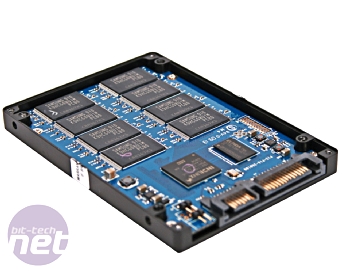Patriot Torqx 128GB SSD Review
July 3, 2009 | 11:55
Companies: #arm #indilinx #patriot #patriot-memory

Patriot Torqx 128GB SSD Review
Manufacturer: Patriot MemoryUK Price (as reviewed): £302.15 (inc. VAT)
US Price (as reviewed): $419.78 (ex. Tax)
With the success of ARM driven SSDs bettering hard drives in all results other than cost per gigabyte, drive partners are getting more and more enthusiastic about selling their increasingly impressive wares.
Whereas previous generations of SSD, from either Samsung or JMicron, have been underwhelming on a number of fronts, particularly with random write speeds, Intel’s cache totting X25-M and X-25-E led the way for the latest models from both Indilinx and Samsung, resulting in arguably the best commercial consumer SSDs available right now, able to resoundingly thrash any mechanical drive by a considerable margin.
While the pricing of such performance is admittedly still a long way on the wrong side of the magic £1/GB mark we know a lot of you are waiting for, for those willing to splash the cash, a decent SSD offers arguably the biggest jump in performance for your general PC experience since the rise of multi-core processors.
The Patriot Torqx SSD we’re looking at today, like the OCZ Vertex and G.Skill Falcon we’ve previously reviewed, is based on the Indilinx IDX110M00 ARM “Barefoot” ARM processor drive controller, which along with Samsung’s competing S3C29RBB01 ARM chip, have so shaken up the SSD market in the past few months, showing that you don’t have to be Intel to make an excellent SSD.
Because the Indilinx drive controller requires a set hardware layout, internally the Torqx, Vertex and Falcon are identical, with all three drives using the same Elpida S51321CBH-6DTT-F 64MB SDRAM cache and sixteen 8GB NAND flash modules. While the Samsung drive controller powers SSDs such as the Corsair P256 and OCZ Summit (review coming soon) ships with a larger 128MB cache, we’ve found that the performance between the two is surprisingly similar, although the Samsung controller seems to have the edge when it comes to write speeds.
While inside it might be the same as the competition from other drive partners, externally the Torqx is a very nice looking bit of kit, with a black aluminium casing and a brushed silver aluminium on the underside. This is complemented by Patriot’s inclusion of a 2.5” to 3.5” hard drive bay adapter, allowing you to install the Torqx into a standard hard disk drive bay in your case.
Clearly this is a nice addition, especially for those who value a neat and tidy case, although as we’ve said it’s not particularly necessary – SSDs require zero airflow and produce absolutely no noise or vibration, so can just as easily be tucked away anywhere inside a PC with some sticky-back tape if necessary.
Also included is a two pin jumper to set the drive into its firmware flashing state. Like the G.Skill Falcon, updating the firmware is only possible from inside another Windows install, so you’ll need to keep a bootable copy handy for when you want to update the drive’s firmware or do it from another PC. Sadly, like the Falcon, updating the firmware will mean losing all the data on you’re drive, so it’s wise to pickup drive imaging software such as Acronis TrueImage so you can back up, update and then restore you’re install.
However, we’re more than a bit disappointed by the support Patriot has been offering for the Torqx so far. Firmware updates for Indilinx based drives come direct from Indilinx rather than individual drive partners, yet despite both OCZ and G.Skill offering the latest v1571 (or v1.3 as OCZ calls it) firmware for over a month, Patriot has yet to make it available thorough it’s support website or support forum. While the drive ships with the v1370 firmware, we’ve been given the v1571 firmware Torqx firmware prior to it's offical release for testing, but the fact that it’s taken so long for Patriot to release it to users is extremly frustrating.
Also annoying is the lack of any kind of defragmentation tool for the drive from Patriot – OCZ and Falcon both offer regularly updated versions of wiper.exe, a defrag program that helps to restore SSD performance following large amounts of cell rewrites. While both OCZ and G.Skill’s tools will work with the Torqx, you shouldn’t have to go to other manufacturers to get support for a product.
Still, with the same core hardware as the OCZ Vertex and G.Skill Falcon, the Torqx should still measure up well when it comes to testing – we’re especially interested to see just how much difference the improved v1571 firmware can offer.

MSI MPG Velox 100R Chassis Review
October 14 2021 | 15:04














Want to comment? Please log in.